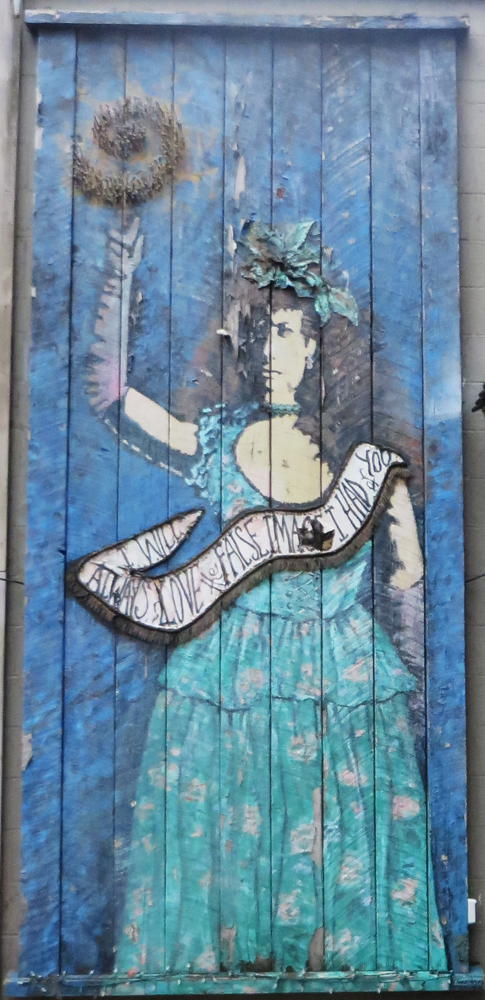Today’s story: We meet today Ralph, of “Ralph’s Popcorn Cake.” Firstly, I find it incumbent upon me to remind everyone that these are not my stories. This cookbook is an ACTUAL cookbook by Erin Ergenbright and Thisbe Nissen, who, my friend Catherine informed me, teaches at her university in western Michigan. (And look at Thisbe’s super-cool notebooks on osperies! She and I should be friends.) Thisbe has a Wikipedia page; Erin does not. Oh, writing: it’s hard to determine what makes someone visible in the literary world. They both did MFA’s at Iowa—the very Iowa to which Hannah from Girls was accepted. On the show, they act like it is a big deal—and it is . . . but it’s not like being in the Mafia, where you can become a “made man.” One thing I find hard, with flashes of finding it wonderful, is that every time you achieve something big, you think you’ve got it made. Sometimes, one big thing opens you up to other big things. Sometimes, you (meaning me) hit it big and then simmer. I hesitate to say “recede.”
This leads us to Ralph. Apparently, Ralph made one of the authors popcorn cake, and she fell in love with him for it, only to “spend the next two months trying to extricate yourself from a relationship that was suddenly not what you thought it was.”
I had a popcorn cake for, I think, my seventh birthday. Or ninth. It was good—think “bundt cake-shaped popcorn ball, with M and M’s.” This version includes gumdrops, which seems like overkill, and pushes it into that category of Midwestern “delights” that you make for a coastal potluck, years later, and can’t believe you ever ate multiple pieces of something that sweet.
The lesson: One big hit does not equal a lifetime of love.
Jerry Seinfeld put it another way:
Of course when you’re a kid, you can be friends with anybody. Remember when you were a little kid what were the qualifications? If someone’s in front of my house NOW, That’s my friend, they’re my friend. That’s it. Are you a grown up.? No. Great! Come on in. Jump up and down on my bed. And if you have anything in common at all, You like Cherry Soda? I like Cherry Soda! We’ll be best friends!
Yeah. I still do that.
If you’ve been reading my “Music and Intimacy” essays, you KNOW I still do that.
I offer my love for a song, literally, pretty often. When I was at Kansas State, a guy drove me out into the country and played Kate Bush’s “Running Up that Hill” for me, while we lay on the warm car hood and a cool summer breeze blew over us. It was the first time I’d heard the song. If you didn’t fall in love then, you are made of stone.
Other times, it’s a sentence a student writes that shows they are moved by something in the world, or a sympathetic look someone gives you at a party that makes you think that even though they don’t know you at all, they totally know. One of my favorite UW students, Nicolene, told me about her deep bond with a friend over a misreading of a line in The Catcher in the Rye. My own best friend from high school, Amy, and I often ended conversations with the words “You know?” “Yeah, I know.” As if tacit understanding was all you needed.
But sometimes, it is. Why does this lesson usually have the implicit moral of “and so, don’t do that again”? It’s true that the “Running Up that Hill” guy wasn’t as spiritual as I thought he was; he was just Christian. Also true is that the student’s beautiful sentence doesn’t always bespeak a complex intellect and struggling soul.
I don’t care. I think I could count on one hand–maybe even one finger–the times those connections really weren’t worth it. Is it really wisdom to start mistrusting those small offerings, those tiny gestures that reach you, even if that person wasn’t reaching out? Are you shallow if you respond equally to a shared secret and popcorn cake? Last week, I told my already-wonderful, brilliant British literature class that I had started watching Game of Thrones. Later in the week, one of them was talking about Heathcliff or Hareton (almost same diff), how he was both part of the family, yet not part of the family, and I said, “So, he’s a Greyjoy?” They erupted in laughter. I swear to God (on all the gods that be!!) class has been even better, even livelier.
I think of my beloved Walter Pater, whose conclusion to The Renaissance inspired the title of this blog: “To burn always with this hard, gemlike flame, to maintain this ecstasy, is success in life.” This is why I will never be the kind of cool that listened to punk rock. Although (of course) I love the Ramones song, I don’t wanna be sedated. I want to be ignited—even by the tiniest of matches, even if, like Hans Christen Anderson’s “The Little Match Girl,” the flame burns out quickly. She is left colder than before and dies, when her matches run out.
I will never run out of matches.

